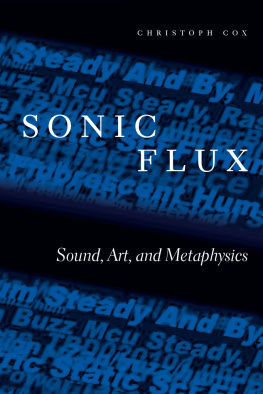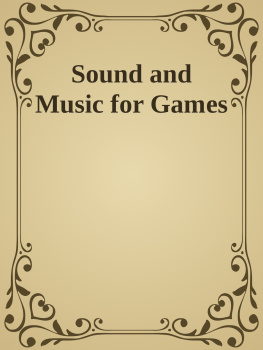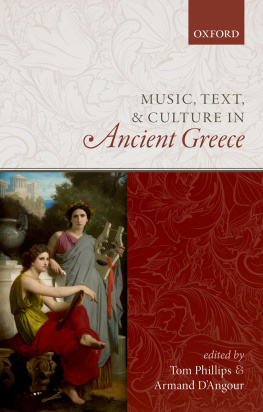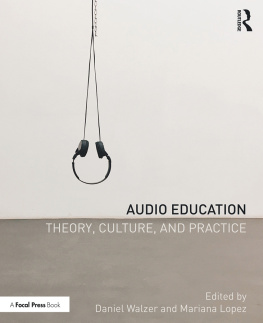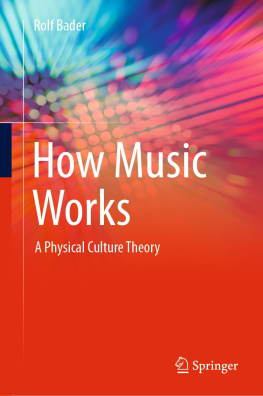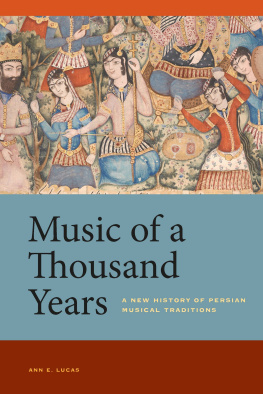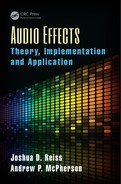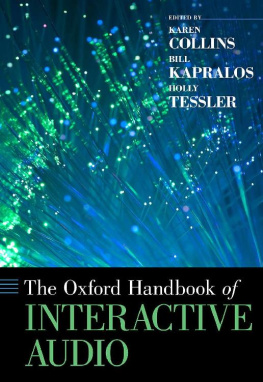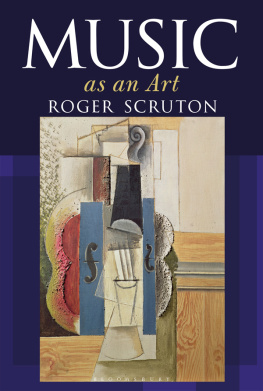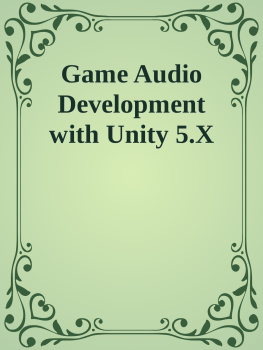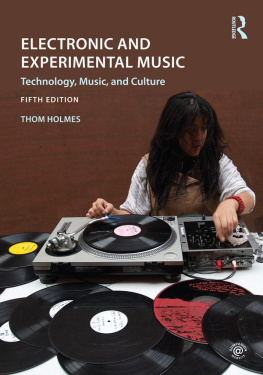Audio Culture
Revised Edition

Contents
A large network of people contributed to the publication of Audio Culture in its two editions. The first edition was ably guided by Continuums David Barker, who enthusiastically supported the project, the revised edition by Bloomsburys Ally Jane Grossan, Michelle Chen, and Leah Babb-Rosenfeld, whom we thank for their patience and generosity. Gabriella Page-Fort superbly copyedited the manuscript and made helpful suggestions and wise decisions. Thanks also to The Wire magazines Rob Young, Tony Herrington, Chris Bohn, and Anne Hilde Neset. Aaron Berman and Eva Rueschmann, Deans of Faculty at Hampshire College, supported our work on the book with a series of faculty development grants for which we are very grateful. A grant from Hampshires European Studies Program, directed by Jim Miller, made possible the translation of Pierre Schaeffers Acousmatics. Several students assisted with the manuscript or suggested materials: Matt Krefting, Matthew Latkiewicz, Daniel Lopatin, Julie Beth Napolin, Aaron Rosenblum, Charlotte Schwennsen, John Shaw, Noel Kirsch, and Kira DeCoudres. Amherst College music librarians Ann Maggs and Jane Beebe generously granted us access to that librarys fine collections. Thanks, too, to a number of friends and colleagues who helped us locate materials and track down authors and artists: Robert Walser, David Rothenberg, Marta Ulvaeus, Stephen Vitiello, Andrew Deutsch, Jon Abbey, Jonas Leddington, Oren Ambarchi, Eddie Prvost, Keith Rowe, Jason Tors, and Eyal Hareuveni. Discographical advice was generously offered by Michael Ehlers, Alan Licht, Thurston Moore, Philip Sherburne, and Matt Krefting. Catherine Dempsey put in hours of work comparing and correcting versions of Brian Enos essays. John Zorn offered helpful criticisms and generously took the time to talk with us about his work. Bill Dietz gave us access to unpublished material in the Maryanne Amacher Archive. Special thanks to Daniel W. Smith for his superb translation of Pierre Schaeffers text, and to Holly Herndon, Kevin Quashie, Marina Rosenfeld, and Philip Sherburne for contributing commissioned essays under tight deadlines.
Our warmest and deepest thanks go to Molly Whalen for her patience, support, and enthusiasm, and to Mary Russo for her love, advice, and encouragement. Finally, we express our sincere gratitude to the writers, composers, and musicians who generously allowed us to reprint their important work.
Every reasonable effort has been made to locate the owners of rights to previously published works and the translations printed here. We gratefully acknowledge permission to reprint the following material:
Chapter
1 From Jacques Attali, Noise: The Political Economy of Music, trans. Brian Massumi (Minneapolis: University of Minnesota Press, 1985). Used by permission of the publisher.
2 From Luigi Russolo, The Art of Noises, trans. Barclay Brown (New York: Pendragon, 1986). Used by permission of the publisher.
3 From Perspectives of New Music 5, no. 1 (Fall-Winter 1966). Used by permission of Chou Wen-Chung for the Estate of Edgard Varse.
4 From Essential Cowell: Selected Writings on Music, ed. Dick Higgins (Kingston, NY: McPherson & Company, 2002). Used by permission of the publisher.
5 From Silence: Lectures and Writings by John Cage (Hanover, NH: University Press of New England/Wesleyan University Press, 1973. Used by permisson of the publisher.
6 From R. Murray Schafer, The Music of the Environment (Wien: Universal Edition, 1973). Used by permission of the author.
7 From Anne Carson, Glass, Irony, and God (New York: New Directions, 1995), incorporating section titles from the version published in Resources for Feminist Research 23, no. 3 (Fall 1994): 2431. Used by permission of the publisher.
8 From The Wire 333 (November 2011): 4246. Used by permission of the author.
9 Commissioned for this volume.
10 From Marshall McLuhan and Bruce R. Powers, The Global Village (New York: Oxford, 1989). Used by permission of the publisher.
11 From Pierre Schaeffer, Trait des objets musicaux (Paris: ditions du Seuil, 1966), translated for this volume by Daniel W. Smith. Used by permission of Jacqueline Schaeffer and the publisher.
12 From Francisco Lpez, Blind Listening, in The Book of Music and Nature, ed. David Rothenberg and Marta Ulvaeus (Middletown, CT: Wesleyan University Press, 2001). Modified with reference to the texts original publication as liner notes to Lpezs recording La Selva V2_Archief V228. Reprinted by permission of the author and David Rothenberg.
13 From Brian Eno, A Year With Swollen Appendices (London: Faber & Faber, 1996). Used by permission of the author.
14 From Pauline Oliveros, Sounding the Margins: Collected Writings 19922009, ed. Lawton Hall (Kingston, NY: Deep Listening Publications, 2010). Used by permission of Ione.
15 From Maryanne Amacher, Psychoacoustic Phenomena in Musical Composition: Some Features of a Perceptual Geography (1977), presented in 1979 at The Mary Ingraham Bunting Institute of Radcliffe College, and About the Big Waves of Structure Borne Sound, previously unpublished. Both texts used by permission of Bill Dietz and the Maryanne Amacher Archive.
16 Evelyn Glennie, Hearing Essay (January 1, 2015), https://www.evelyn.co.uk/hearing-essay. Used by permission of the author.
17 From Iain Chambers, Migrancy, Culture, Identity (London: Routledge, 1994). Used by permission of the author and Routledge/Taylor & Francis.
18 From Anahid Kassabian, Ubiquitous Listening: Affect, Attention, and Distributed Subjectivity (Berkeley: University of California Press, 2013). Used by permission of the publisher.
19 From Lawrence Abu Hamdan, The Freedom of Speech Itself: A Contemporary Chronology of Forensic Listening, Cabinet 43 (Fall 2011). Used by permission of the author.
20 From On Horizons: A Critical Reader in Contemporary Art, ed. Maria Hlavajova, Simon Sheikh, and Jill Winder (Utrecht: BAK/Rotterdam: Post Editions, 2011). Used by permission of the authors.
21 From High Fidelity (April 1966). Used by permission of Glenn Gould Estate.
22 From Down Beat 50 (July 1983) and (August 1983), edited by Howard Mandel. Used by permission of the author.
23 From The Whole Earth Review (Winter 1987). Used by permission of the author.
24 From Musicworks 60 (Fall 1994). Slightly modified and used by permission of the author.
25 From Kodwo Eshun, More Brilliant Than the Sun: Adventures in Sonic Fiction (London: Quartet, 1998). Used by permission of the author.
26 From The Wire 327 (April 2011). Used by permission of the author.
27 From Leonardo Music Journal 25 (2015). Used by permission of the author.
28 From Umberto Eco, The Open Work, trans. Anna Cancogni (Cambridge, MA: Harvard University Press, 1989).
29 From Silence: Lectures and Writings by John Cage (Hanover, NH: University Press of New England/Wesleyan University Press, 1973. Used by permission of the publisher.
30 From the catalog to Perspectives 163: Every Sound You Can Imagine, curated by Christoph Cox, Contemporary Arts Museum Houston, October 3December 2, 2008. Used by permission of the author.
31 From Current Musicology 67/68 (2002). Used by permission of the Earle Brown Music Foundation.
32 The first portion of this chapter appeared as liner notes to John Zorn, Cobra


